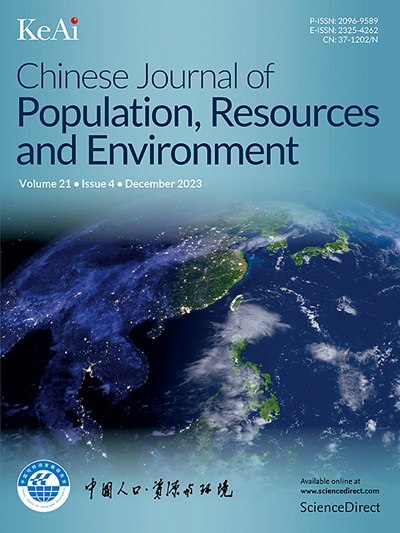Enhancing energy security through efficient decarbonization: Impact of China’s “Constructing Large Units and Restricting Small Ones” policy on thermal power productivity
IF 4.8
4区 环境科学与生态学
Q2 ENVIRONMENTAL STUDIES
Chinese Journal of Population Resources and Environment
Pub Date : 2025-06-01
DOI:10.1016/j.cjpre.2025.05.003
引用次数: 0
Abstract
Developing low-carbon and efficient power systems is critical for energy security in the global warming context. We address this issue by focusing on the productivity impact of a decarbonization policy in China’s thermal power sector—namely, the “Constructing Large Units and Restricting Small Ones” (CLRS) initiative. Utilizing a resource misallocation model, we construct a new theoretical framework to distinguish between technical and allocative efficiency and analyze productivity using plant-level data. The results indicate that the CLRS policy has significantly improved the allocative and technical efficiency of China’s coal-fired power sector, thereby ensuring power security. The closure of outdated and highly distorted small coal-fired units, which have been replaced by technologically advanced large units, primarily drives the enhanced efficiency. The policy’s effects are most pronounced in large-scale power plants and those with high coal combustion efficiency. Furthermore, a comparison of power plants’ productivity distribution before and after policy implementation reveals that the CLRS policy not only enhances capital productivity in the coal-fired power sector but also increases rational labor allocation. Our findings have important policy implications for developing countries vis-à-vis building efficient and stable power systems amid climate change.
以高效脱碳提升能源安全:中国“建大限小”政策对火电产能的影响
在全球变暖的背景下,发展低碳高效的电力系统对能源安全至关重要。我们通过关注中国火电行业脱碳政策——即“建大限小”(CLRS)倡议——对生产率的影响来解决这一问题。利用资源错配模型,我们构建了一个新的理论框架来区分技术效率和配置效率,并利用工厂层面的数据分析生产率。结果表明,CLRS政策显著提高了中国煤电行业的配置效率和技术效率,从而保障了电力安全。淘汰落后、变形严重的小型燃煤机组,代之以技术先进的大型燃煤机组,是提高效率的主要动力。该政策的影响在大型发电厂和燃煤效率高的发电厂最为明显。此外,通过对政策实施前后电厂生产率分布的比较,可以发现CLRS政策不仅提高了煤电行业的资本生产率,而且促进了劳动力的合理配置。我们的研究结果对发展中国家在气候变化中建立高效和稳定的电力系统具有重要的政策意义-à-vis。
本文章由计算机程序翻译,如有差异,请以英文原文为准。
求助全文
约1分钟内获得全文
求助全文
来源期刊

Chinese Journal of Population Resources and Environment
ENVIRONMENTAL STUDIES-
CiteScore
4.30
自引率
1.10%
发文量
791
审稿时长
79 days
期刊介绍:
The Chinese Journal of Population, Resources and Environment (CJPRE) is a peer-reviewed international academic journal that publishes original research in the fields of economic, population, resource, and environment studies as they relate to sustainable development. The journal aims to address and evaluate theoretical frameworks, capability building initiatives, strategic goals, ethical values, empirical research, methodologies, and techniques in the field. CJPRE began publication in 1992 and is sponsored by the Chinese Society for Sustainable Development (CSSD), the Research Center for Sustainable Development of Shandong Province, the Administrative Center for China's Agenda 21 (ACCA21), and Shandong Normal University. The Chinese title of the journal was inscribed by the former Chinese leader, Mr. Deng Xiaoping. Initially focused on China's advances in sustainable development, CJPRE now also highlights global developments from both developed and developing countries.
 求助内容:
求助内容: 应助结果提醒方式:
应助结果提醒方式:


